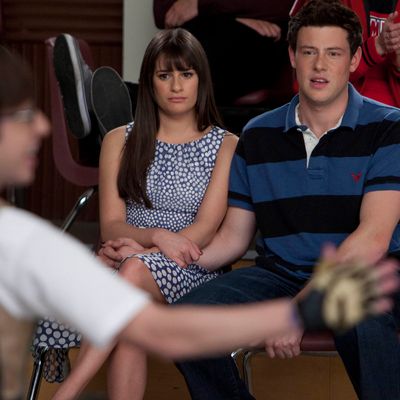
Regardless of the cause, Cory MonteithÔÇÖs death is a tragic one. He was young and talented ÔÇö┬áa gifted drummer, an awkward-as-hell dancer, and a reliable nailer of power ballads. And he was Finn Hudson, GleeÔÇÖs main testament to the life-changing power of music, arguably the showÔÇÖs primary message.
The loss of Finn alters the showÔÇÖs landscape permanently and irrevocably. ThereÔÇÖs a part of me that thinks, ÔÇ£Is it too soon to consider what the show will look like now that heÔÇÖs gone?ÔÇØ But as VultureÔÇÖs Glee recapper for the past two seasons, I think that considering the question is a respectful act; it speaks to his invaluable contribution. And GleeÔÇÖs cast and creative team donÔÇÖt have the luxury of declaring it too soon to move forward; filming on season five is currently scheduled to begin in a week or so, and the writers have been at work for a while now. While Ryan Murphy hasnÔÇÖt said much publicly about what this year holds, he negotiated a two-season renewal for Glee last spring, and consensus is that he wouldnÔÇÖt have been able to do so without some sort of master plan (or at the very least, a general sense) of how this next chunk of story plays out.
This isnÔÇÖt a reshuffling of the deck, then. ItÔÇÖs 52 Pickup. Whenever Glee has been at a loss for story in the past, itÔÇÖs circled back to three key relationships: Kurt and Blaine, Brittany and Santana, and Finn and Rachel. MonteithÔÇÖs death and Heather MorrisÔÇÖs departure further destabilize a show already on shaky ground as it struggles to take on a more mature tone following the graduation of several of its main characters from high school. Deftly tackling the narrative challenge of FinnÔÇÖs departure from the show seems an almost impossible task. If the season begins with Finn glibly written out (ÔÇ£Oh, he moved to L.A. with Mercedes!ÔÇØ), it will be criticized for insensitivity; if FinnÔÇÖs storyline mirrors MonteithÔÇÖs passing more closely, it will be criticized for exploitation.
Glee has always encouraged viewers to suspend disbelief when it comes to the fact that its main cast is a bunch of 20-something-year-old adults pretending to be teens. TheyÔÇÖve done this by emphasizing the characters rather than the actors (consider, for example, the fact that the entire cast did a world tour completely in character) and by near-obsessive control of the castÔÇÖs collective public image.
Sure, there have been drunk appearances at award shows and magazine spreads of questionable taste, but for a cast of late Millennials (Monteith was 31), heady on fame or something close to it for the first time, they come off as reasonably wholesome. Even MonteithÔÇÖs own stint in rehab this spring was spun by the powers that be at Glee not as a scandal, but as a responsible choice by someone taking control of his own well-being (and rightly so). GleeÔÇÖs promise of youth and escape is seen clearly in its return to Katy PerryÔÇÖs ÔÇ£Teenage DreamÔÇØ in multiple episodes, almost as an anthem. ÔÇ£You and I,ÔÇØ Glee promises, ÔÇ£WeÔÇÖll be young forever.ÔÇØ
That image of squeaky-clean youth is shattered now, and that seems irreversible. Glee works as escapist television, and it almost always flounders when it tries to be something bigger. Season fourÔÇÖs misbegotten school shooting, prostate cancer, teen molestation, and eating disorder storylines ÔÇô all either insensitively handled or dropped without explanation ÔÇô are undeniable proof of that.
MonteithÔÇÖs final performance on Glee was a reprise of ÔÇ£DonÔÇÖt Stop BelievinÔÇÖ,ÔÇØ the same song that closed the pilot. ItÔÇÖs just a coincidence, although itÔÇÖs hard not to lend it more significance than it perhaps deserves. Either way, Cory MonteithÔÇÖs death means it will be a little harder to believe in Glee from now on.

